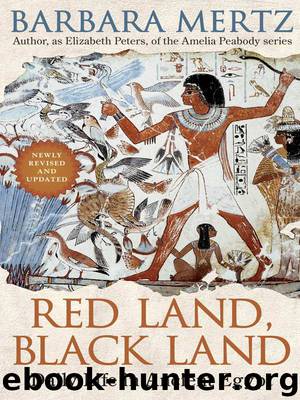Red Land, Black Land: Daily Life in Ancient Egypt by Barbara Mertz

Author:Barbara Mertz [Mertz, Barbara]
Language: eng
Format: mobi, epub
Publisher: HarperCollins
Published: 2011-01-25T05:00:00+00:00
EGYPTIAN MAGIC
Since we have just demonstrated, at some length, that we ought to try to look at the world as the Egyptians looked at it, we will have to talk about magic, so far as is possible, in their terms. It is “no fair” to construct an artificial subject called “Egyptian magic” and dump into it all the activities we would call by that name.
What are these activities? They would certainly include the following: cursing (including killing); curing; erotic magic; agricultural (including weather); divination; resurrection. Since magic and medicine are hard to untangle, and since the Egyptians did not, as a rule, try to untangle them, we will discuss curative magic under medicine. Resurrective magic, designed to reanimate the dead and insure them a happy existence in the hereafter, is perhaps the area about which we have the most information. We would call it magic since, by our system of belief, any attempts to win immortality except the ones set forth in our own creeds are nothing but pagan superstition. This is a little hard on the Egyptians, who undoubtedly thought they were being properly religious. So we are going to talk about resurrective magic under mortuary beliefs.
This still leaves us with a respectable body of material. However, not all our categories are represented in ancient Egypt, or else they are represented only by hints or casual allusions. We know very little about weather and agricultural magic, and most of what we do know would have been called religious by the Egyptians—if they had possessed a word for religion. The prosperity and productivity of the country did not depend on rain but on the annual rise of the Nile, whose inundation watered and fertilized the soil. The river itself was a god, named Hapi, and the great mortuary god Osiris was connected not only with the resurrection of the dead but with the rebirth of the new grain. Great state rituals, conducted by the king or his representatives, honored these gods and assured the yearly inundation on which the crops depended. I suspect, from what we know of other societies, that the ancient fellahin (peasants) of Egypt may have had their own magical ceremonies to make sure the crops were abundant. But nothing is known of this, if it was done.
Spells designed to curse and kill an enemy conform more closely to our definition of magic, in that they are normally free of invocations to a god. Egyptian cursing texts were written on rough pottery bowls or on figurines, which were then flung down and smashed to bits. The inscriptions name the enemies whose lives are to be broken as the bowls are smashed. Many examples name rulers of cities in Syria or Nubia, so they must have been official state curses. Others name Egyptians: “Ameni shall die, the tutor of Sit-Bastet.” These may have been private grudges. With the meticulous thoroughness which I like to consider typically Egyptian, another text curses: “Every evil word, every evil speech, every evil
Download
Red Land, Black Land: Daily Life in Ancient Egypt by Barbara Mertz.epub
This site does not store any files on its server. We only index and link to content provided by other sites. Please contact the content providers to delete copyright contents if any and email us, we'll remove relevant links or contents immediately.
| Africa | Americas |
| Arctic & Antarctica | Asia |
| Australia & Oceania | Europe |
| Middle East | Russia |
| United States | World |
| Ancient Civilizations | Military |
| Historical Study & Educational Resources |
The Daily Stoic by Holiday Ryan & Hanselman Stephen(3299)
The Fate of Rome: Climate, Disease, and the End of an Empire (The Princeton History of the Ancient World) by Kyle Harper(3055)
People of the Earth: An Introduction to World Prehistory by Dr. Brian Fagan & Nadia Durrani(2727)
Ancient Worlds by Michael Scott(2682)
Babylon's Ark by Lawrence Anthony(2671)
The Daily Stoic by Ryan Holiday & Stephen Hanselman(2569)
Foreign Devils on the Silk Road: The Search for the Lost Treasures of Central Asia by Peter Hopkirk(2455)
India's Ancient Past by R.S. Sharma(2450)
MOSES THE EGYPTIAN by Jan Assmann(2411)
The Complete Dead Sea Scrolls in English (7th Edition) (Penguin Classics) by Geza Vermes(2277)
The Earth Chronicles Handbook by Zecharia Sitchin(2226)
Lost Technologies of Ancient Egypt by Christopher Dunn(2223)
24 Hours in Ancient Rome by Philip Matyszak(2078)
Alexander the Great by Philip Freeman(2064)
Aztec by Gary Jennings(2021)
The Nine Waves of Creation by Carl Johan Calleman(1915)
Curse Tablets and Binding Spells from the Ancient World by Gager John G.;(1860)
Before Atlantis by Frank Joseph(1849)
Earthmare: The Lost Book of Wars by Cergat(1823)
